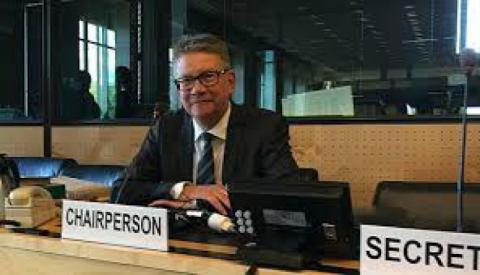
In view of Kuwait's third periodic review, on 4 July 2016, Alkarama submitted its shadow report to the UN Committee Against Torture (CAT) analysing the legal framework for the prohibition of torture and its practice in Kuwait. During its 58thsession which will take place between 25 July and 12 August, the Committee's experts will assess* the implementation of the Convention against Torture and Other Cruel, Inhuman or Degrading Treatment or Punishment (UNCAT), ratified by Kuwait in 1996, on the basis of information provided by both NGOs, including Alkarama, as well as the State party in its national report.
The review takes place one month after the State of Kuwait has already been reviewed by the UN Human Rights Committee (HRCtee), which expressed its concerns over the general deterioration of fundamental rights in its Concluding Observations.
While the practice of torture in Kuwait cannot be described as systematic, Alkarama has documented several cases of torture in the country. What is concerning is the lack of compliance of Kuwait's legal framework with the Convention as well as lack of knowledge of the Convention's obligations, training of law enforcement officers and effective implementation of the UNCAT.
Lack of absolute prohibition of torture
In its report to the Committee, Alkarama noted that Kuwait lacks a proper definition of torture. Indeed, it assimilates torture to several other crimes but does not define torture per se as required by article 1 of the Convention. Furthermore, the law does not provide for punishments that reflect the gravity of the crime and torture qualifies as a misdemeanour rather than a crime.
Of concern is the fact that the Criminal Code of Procedure allows for "any means" to be used during the investigation which could allow for torture to be used in order to extract confessions and is in contravention with the absolute prohibition enshrined in the Convention.
Alkarama thus recommended that Kuwait defines torture in accordance with the Convention and as a stand-alone crime and that the punishments for perpetrators of torture be proportional with the gravity of such an act.
Violations of legal safeguards related to deprivation of liberty
An individual is most at risk of torture when deprived of his liberty in a system that does not provide for adequate legal safeguards, such as access to a lawyer from the onset of detention or the right to be promptly presented to a judge. Indeed, most acts of torture are committed during the investigation and pre-trial detention stages.
Although in 2012, Kuwait amended its Code of Criminal Procedure providing for more adequate protection such as reducing the period of police custody from four to two days; the new legal framework cannot be considered as abiding by international legal standards as it still does not provide for all guarantees of a fair trial. Furthermore, cases documented by Alkarama after the Code's entry into force show that the new provisions are not being respected or implemented by law enforcement officials.
Alkarama therefore urged the Kuwaiti authorities to revise its Code of Criminal Procedure to align it with international standards and to provide adequate training to law enforcement officials.
Failure to investigate and prosecute acts of torture
Kuwait's detention centres lack proper independent complaint mechanisms for individuals to report that they have been subjected to torture. In its report, the State party affirms that the General Department of Monitoring and Inspection is the authority that receives complaints of abuse of power and ill-treatment. However, as this department is also in charge of "maintaining the police's reputation and image", the department's impartiality can be disputed.
Along with this department, in 2015, Kuwait established the "Diwan Huquq Al Insan", its National Human Rights Institution; however, since its members are appointed by the Emir, its independence and effectiveness can also be questioned.
Kuwait further failed to prove that torture claims are being properly investigated and that those found responsible have been prosecuted. Indeed, Kuwait's state report provides statistics illustrating that most cases are still pending or were dropped due to lack of evidence or expiration of time. In only three cases have officers been released from service while others have only faced a reduction of salary.
Alkarama recommended that Kuwait set up an independent mechanism for the monitoring of detention centres and the receiving of complaints and that Kuwait further promptly and impartially investigate all torture claims and prosecute those responsible in accordance with the severity of their crimes.
Alkarama hopes that the concerns raised in its shadow report will be addressed constructively during the dialogue between the Committee against Torture and the representatives of the State Party, which will be held on 25 and 26 July between 3 and 6 pm and can be watched live on the Treaty Body webcast.
*During the review, you can follow @AlkaramaHR and @JuliaLegner for live tweets. You can also read our full alternative report here.
For more information or an interview, please contact media@alkarama.org (Tel: +41 22 734 1008).
